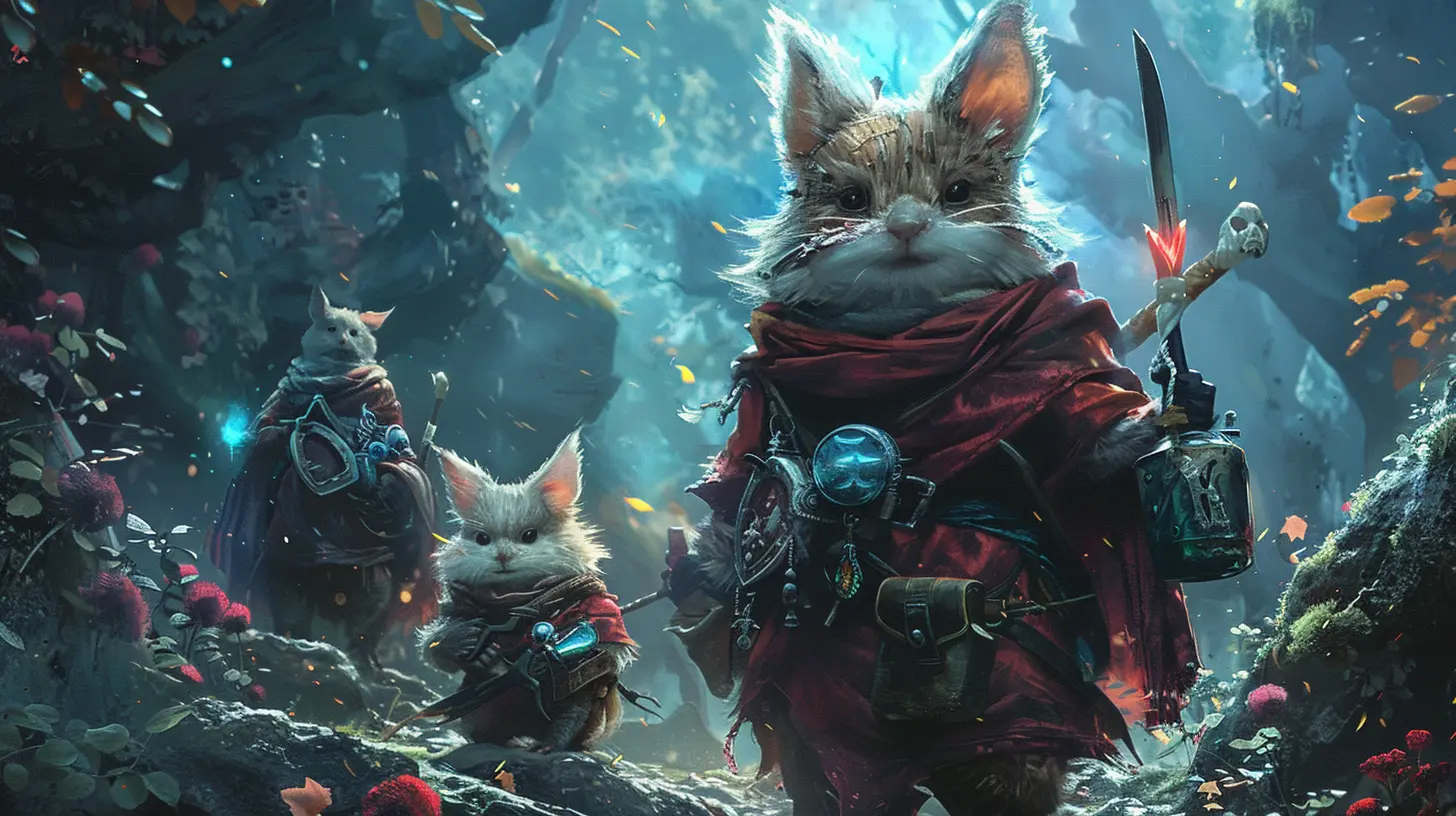Exploring the Ethics of Free-to-Play Games and Microtransactions
22 May 2025
Gaming has come a long way since the days of blowing into cartridge slots or waiting seven minutes for a CD-ROM to load. Today, we can dive into immersive, jaw-dropping worlds without paying a cent. Sounds like a dream come true, right? Well, not so fast. Free-to-play (F2P) games, despite their "free" label, often come with a catch: microtransactions. And here's where things get murky.
Microtransactions have become the lifeblood of many free-to-play titles, but they’ve also sparked heated debates about ethics in gaming. Are these small in-game purchases a harmless business model, or are they exploiting players? Let’s break it down and get into the nitty-gritty of this hot-button issue.
What Are Free-to-Play Games and Microtransactions?
Before we dive into ethics, let’s make sure we’re all on the same page.Free-to-play games are exactly what they sound like—games you can download and play without shelling out upfront cash. Think "Fortnite," "Candy Crush," or "Genshin Impact." But if developers aren’t charging you to play, how do they make money? Enter microtransactions.
Microtransactions are small, in-game purchases that players can make with real money. These can range from cosmetic skins and new characters to power-ups and loot boxes. For example, you might spend $5 to unlock a cool outfit for your avatar or $1 for a chance to spin a wheel of fortune. Sounds harmless, right? Well, some of these systems are more complicated (and controversial) than they appear.
The Allure of Free-to-Play: Why It Works
Let’s be real—who doesn't love free stuff? Free-to-play games are irresistibly low-risk because there’s no upfront cost. This model works because it lowers the barrier to entry. Whether you’re a casual gamer or someone just curious to see what the hype is about, you can jump in without commitment.Once players are in, though, microtransactions kick in. Here's the thing: developers aren’t just banking on generosity for their income. They rely on strategic psychology to make spending money feel almost… inevitable.
The Power of FOMO (Fear of Missing Out)
Ever feel like you have to buy that limited-edition costume before it's gone forever? Congratulations, you’ve been hit by the FOMO hammer. Many games use limited-time offers to create urgency, making players feel like they'll miss out if they don’t act fast.This tactic works especially well in games with a strong social component. When everyone on your team is rocking that cool new outfit or weapon, it’s easy to feel left out. No one wants to be the odd one out, and game developers know this.
The Psychology of Loot Boxes
Here’s where things get even trickier. Loot boxes, a type of microtransaction, are like real-life mystery boxes. You pay a set amount, but you don’t know what you’re going to get—it could be a rare item… or something totally useless. Sound familiar? That’s because loot boxes share some similarities with gambling.This gambling-like mechanic taps into our natural love for risks and rewards. And let’s face it, it’s hard to resist the thrill of possibly scoring something amazing. But for some people, this thrill can turn into an addiction, leading to a vicious cycle of spending.
The Ethical Dilemma: Where Do We Draw the Line?
On paper, free-to-play games and microtransactions seem harmless. After all, no one is forcing players to spend money, right? But the reality isn’t quite that simple.Are Microtransactions Preying on Vulnerable Players?
One of the biggest criticisms against microtransactions is that they can exploit vulnerable players, especially kids and teenagers. Think about it: younger gamers might not fully understand the value of money or the mechanics behind these systems. Combine that with cleverly designed games, and you’ve got a recipe for trouble.It’s not just kids, though. Adults can fall into the same traps, especially those who might struggle with impulse control or addictive behaviors. For some, a “harmless” $5 purchase spirals into hundreds—or even thousands—of dollars spent.
Pay-to-Win vs. Fair Play
Another ethical issue is the “pay-to-win” aspect of some free-to-play games. While many microtransactions are purely cosmetic (like outfits or skins), others can provide gameplay advantages. For example, you might be able to pay to boost your character's stats or unlock powerful items.This creates an uneven playing field where those who spend money gain a significant advantage over those who don’t. Imagine playing soccer, but the other team can pay extra to use two goalkeepers. It’s frustrating, right? For many gamers, this undermines the sense of fairness and competition that makes games fun in the first place.
Lack of Transparency
Let’s talk about communication. How upfront are game developers when it comes to their microtransaction systems? Unfortunately, not very. Some games bury purchase information in fine print or make the costs intentionally confusing.For instance, many games use virtual currencies instead of direct cash transactions. So instead of spending $5, you’re spending 500 gems. But how much is a gem really worth? This lack of transparency can make it harder for players to track how much they’re actually spending.
The Industry's Defense: Are Microtransactions Really That Bad?
To be fair, the gaming industry has its side of the story too. Developers argue that microtransactions are what keep free-to-play games alive. Creating, maintaining, and updating a game isn’t cheap, especially for live-service titles that require constant attention.Funding Innovation
Without microtransactions, many innovative games might not exist. The revenue generated by free-to-play models allows smaller studios to compete with juggernauts, leveling the playing field.It also gives players more choice. Not everyone can afford a $60 game, but free-to-play models make gaming more accessible to people around the world. As long as purchases are optional, players can enjoy games on their own terms.
Self-Control and Personal Responsibility
Another common argument is that players have a responsibility to manage their spending. After all, no one is making you buy that loot box, right? Developers argue that it’s ultimately up to the player to decide how much—if anything—they spend on a game.What Can Be Done to Make Microtransactions More Ethical?
So, is there a middle ground? Thankfully, some steps can be taken to make microtransactions less controversial without killing the free-to-play model.Better Regulation
Governments and regulatory bodies can step in to set clear rules. For example, some countries have already labeled loot boxes as a form of gambling, requiring stricter oversight. These rules can help protect younger and more vulnerable players.Transparency and Clear Pricing
Developers could also take steps to be more upfront about their pricing models. Instead of hiding costs behind virtual currencies or vague descriptions, why not make everything clear and easy to understand? Transparency helps build trust with players.Age Restrictions and Parental Controls
Adding stricter age verification systems or parental controls can go a long way in protecting younger players. Some games already have these features, but they should become a standard practice across all titles.Rewarding Skills Over Spending
Let’s bring back the focus on skill and strategy. Developers could design games that reward players for their performance, not their wallets. This way, everyone can enjoy a fair and competitive experience.Conclusion: A Complex Debate
At the end of the day, the ethics of free-to-play games and microtransactions aren’t black and white. There are valid arguments on both sides, and the line between fair business practices and exploitation can be hard to define.But one thing is clear: as the gaming industry continues to evolve, players deserve to feel respected, informed, and empowered. Whether you’re a casual gamer or a die-hard fan, it’s important to stay mindful of your spending—and don’t let FOMO or flashy offers get the best of you.
What do you think? Are microtransactions a necessary evil or a step too far? Let me know in the comments below!
all images in this post were generated using AI tools
Category:
Game DevelopmentAuthor:

Greyson McVeigh
Discussion
rate this article
3 comments
Natalia Baxter
Thank you for shedding light on such an important topic! The ethical implications of free-to-play games and microtransactions significantly impact player experience and industry standards. It's crucial we continue discussing these issues to promote fairness and transparency in gaming. Looking forward to more insights!
May 29, 2025 at 4:46 AM

Greyson McVeigh
Thank you for your thoughtful comment! I agree that ongoing discussions about fairness and transparency in gaming are essential for improving player experiences and industry practices. Stay tuned for more insights!
Anabella McKenzie
This article provides a crucial examination of free-to-play games, highlighting the ethical implications of microtransactions, especially how they impact player experience, affordability, and the potential for exploitative practices.
May 28, 2025 at 3:59 AM

Greyson McVeigh
Thank you for your insightful comment! I'm glad you found the examination of ethical implications in free-to-play games valuable. Your thoughts on player experience and affordability are vital to the ongoing discussion.
Sara McMahan
Free-to-play models often walk a fine line between accessibility and exploitation. While they democratize gaming, ethical microtransactions can feel like an invitation to spend, leaving players questioning whether they’re truly in control of their experience.
May 27, 2025 at 2:43 PM

Greyson McVeigh
You're absolutely right. Balancing accessibility and ethical monetization in free-to-play games is crucial, as it directly impacts player experience and trust.



